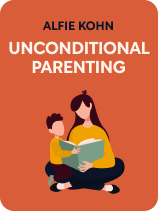

This article is an excerpt from the Shortform book guide to "Unconditional Parenting" by Alfie Kohn. Shortform has the world's best summaries and analyses of books you should be reading.
Like this article? Sign up for a free trial here .
What is most important for first-time parents to know? What advice can you learn from research in parenting?
As a first-time parent, you might feel overwhelmed by the amount of parenting advice available to you. However, author Alfie Kohn’s Unconditional Parenting book takes a simple approach to effective parenting: showing your children unconditional support, acceptance, and understanding.
If you’re a first-time parent looking for proven advice, keep reading to learn Kohn’s unconditional parenting technique.
Unconditional Parenting for First-Time Parents
Unconditional Parenting, published in 2005, was an early contribution to the popular “gentle parenting” movement: a set of loosely associated approaches that move away from traditional discipline methods. Advocates for gentle parenting argue that it fosters autonomy, develops stronger parent-child bonds, and builds children’s internal motivation.
Kohn is the author of 14 books, most of which focus on education and parenting. In Unconditional Parenting, he argues that most of us have learned to parent in a “conditional” way: That is, we make our children believe that we only love them when they do what we want. We’ll look at some key guidelines to keep in mind if you want to bring unconditional parenting into your home as a first-time parent.
What Is Unconditional Parenting?
As a first-time parent, Kohn strongly advises not to use ineffective and damaging conditional parenting tactics. Rather, Kohn proposes “unconditional parenting.” This means making it absolutely clear to your child that your love doesn’t depend on their compliance.
What does unconditional parenting look like for first-time parents? Unconditional parenting:
1. Prioritizes the relationship over the behavior. Kohn argues that people who use rewards and punishments treat the parent-child relationship as transactional. But while transactional relationships are common for adults, they’re not appropriate within families. Parental love and affection shouldn’t have to be earned.
2. Prioritizes long-term goals over short-term ones. First-time parents should recognize the importance of how different parenting styles have both short- and long-term effects on children. Conditional parenting techniques might make a child comply right now, but they don’t help her to develop empathy, autonomy, and healthy self-esteem in the long run.
3. Prioritizes the child’s developmental needs over convenience for first-time parents. Let’s be honest—parents often demand that a child do something because it makes the parent’s life easier, not because they have his best interests at heart. Unconditional parenting is putting the child first right from the beginning. To do this as a first-time parent, you’ll need to be patient, flexible, and scrupulously honest about your motivations.
4. Sees the child as an active, rather than a passive, participant. Kohn recommends “working with” children rather than “doing to” them, which means seeing difficult behavior as a problem to be solved together, rather than as a trigger for criticism or punishment.
(Shortform note: Kohn doesn’t discuss the science behind this readjustment of priorities, but it’s becoming increasingly clear that kids’ brains benefit from a close, supportive relationship with their caregivers, that first-time parents who focus on long-term goals behave in a more nurturing way and are better at explaining their reasoning, and that children who see discipline as fair are more likely to comply. And one interesting joint problem-solving method—though Kohn likely wouldn’t endorse this approach—is asking kids to come up with their own punishments. Kids are often surprisingly fair in determining punishments, and may even go too far, turning into barbaric “little Stalins.”)
Kohn notes that unconditional parenting is much more demanding on first-time parents than falling back on rewards and punishments. Parents who want to move toward unconditional parenting have to be patient, self-aware, and scrupulously honest with themselves and their kids. They also have to battle the tendency to pass conditional parenting from generation to generation.
(Shortform note: Though conditional parenting does seem in part to be generational, there’s also evidence that parenting in many societies is becoming more sensitive and affectionate across the board. This could partly be due to increasing education levels, which seem to be associated with a more sensitive approach.)
Long-Term Benefits of Unconditional Parenting
Kohn acknowledges that unconditional parenting is far more demanding than traditional parenting methods, but promises that your investments as a first-time parent will be reflected in happier, more independent, more thoughtful children who will grow up to be loving parents to their own children.
(Shortform note: Interestingly, sensitive parenting also seems to have long-term financial benefits for both individual families and society in general. Families with sensitive parents tend to spend less on their children, while the children of sensitive parents prompt less public spending in the form of health and social services.)
As Kohn points out throughout his Unconditional Parenting book, children look to their parents to model desirable behavior, and parenting style tends to be passed from generation to generation. This means that treating children with respect, flexibility, humility, and compassion now is the best way to make sure those qualities flourish in generations to come.
| Is Gentle Parenting Realistic for First-Time Parents? As we mentioned at the start, Kohn’s book is part of a wider “gentle parenting” movement. While advocates of the movement have achieved Instagram and TikTok fame, others argue that it sets parents up to fail, is time-consuming and exhausting, prioritizes the emotions of the child at the expense of everything else, and traps parents in the role of “a self-renouncing, perpetually present humanoid who has nothing but time and who is programmed for nothing but calm.” All things considered, gentle parenting is likely yet another swing of the parenting advice pendulum, destined to be replaced in a few years by a new wave of parenting advice with a different focus. Unlike behaviorism, however, this approach will leave a legacy of empathy, connection, and reflection in parenting, and should at the very least serve as a correction to some of the more severe and oppressive parenting practices of the past. |

———End of Preview———
Like what you just read? Read the rest of the world's best book summary and analysis of Alfie Kohn's "Unconditional Parenting" at Shortform .
Here's what you'll find in our full Unconditional Parenting summary :
- How to raise kids to be self-confident, independent, and compassionate
- Why you should throw away the standard parenting rulebook
- Why rewards and punishments cause more harm than good






